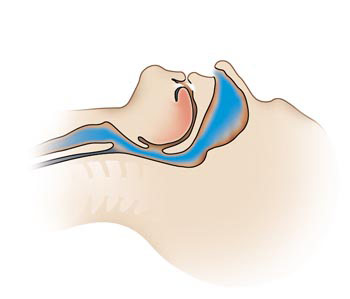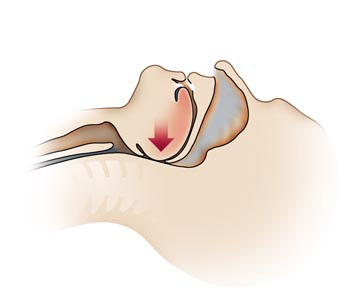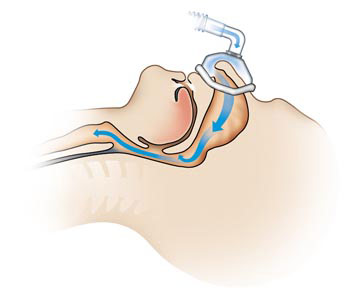About Sleep Apnea
Questions?
If you have any questions that are not addressed below, please do not hesitate to contact our office. We'll be happy to help.
About Obstructive Sleep Apnea (OSA)
- What is Sleep Apnea?
- How do I know if I have Obstructive Sleep Apnea?
- How is Obstructive Sleep Apnea treated?
- What are the benefits of CPAP Therapy?
- Are there any other Sleep Apnea Therapies?
Question
What Is Sleep Apnea?
Answer:
Sleep Apnea Is An Absence Of Breathing During Sleep. There Are 3 Types Of Sleep Apnea:
- Obstructive Sleep Apnea (OSA - See below)
- Central Sleep Apnea (CSA): the brain stops sending messages to the breathing muscles and breathing temporarily stops)
- Mixed Sleep Apnea (a combination of OSA and CSA)
Obstructive Sleep Apnea (OSA) is the most common type of sleep apnea. It is a condition where an individual repeatedly stops breathing in their sleep due to an obstruction of the upper throat (airway).
In the affected person, the muscles around the throat cannot support the soft tissues surrounding the airway during deep sleep. The result is a collapse of the throat tissues into the airway, preventing air from entering and exiting the lungs.

Normal Breathing (Open Airway)

Obstructed Airway
The stoppage in breathing leads to a decreased blood oxygen level, causing to the person to wake up. The cycle of interrupted sleep may repeat itself hundreds of times per night, leading to sleep debt, cardiovascular disease and diabetes.
Many OSA sufferers do not remember waking up during these episodes and endure the condition, unaware that there is anything wrong with their sleep.
Signs And Symptoms Of OSA May Include:
- Loud, irregular snoring
- Excessive daytime sleepiness
- Memory impairment
- Poor concentration
- Morning headaches
- Irritability
- Sexual dysfunction
Consequences Of Untreated OSA May Include:
- High blood pressure
- Heart disease
- Stroke
- Diabetes
- Increased risk of work related injuries or motor vehicle accidents
Question
How Do I Know If I Have Obstructive Sleep Apnea?
Answer:
You Should Speak With Your Family Physician.
If you suspect that you have sleep apnea or any other sleep disorder, you should speak with your family physician. Your family physician will refer you to a sleep specialist who will most likely order a sleep study (polysomnogram) in a sleep lab. During a sleep study, your sleep will be monitored by sleep technologists. Some of the parameters recorded during the study are brainwaves, muscle tone, breathing efforts, the heart beat, body position, blood oxygen level and air flow at the nose and the mouth. All of this information will be interpreted by the sleep specialist and who will notify you of the findings. If the diagnosis of a sleep disorder is made, you will be advised by the sleep specialist of the available therapeutic options.
Question
How Is Obstructive Sleep Apnea Treated?
Answer:
There are several available treatments for OSA. The most common and effective treatment for Obstructive Sleep Apnea is CPAP therapy.
CPAP (Continuous Positive Airway Pressure) therapy is the most common and effective treatment for OSA. This method works by delivering pressurized air to the airway. This air pressure acts as a pneumatic "splint", effectively pushing against the throat tissues and keeping the airway open during sleep.
CPAP is delivered to the upper airway through the nose or the mouth by a CPAP mask that is connected to an air compressor, a CPAP machine. The amount of air pressure provided by the CPAP machine is set according to a prescription from your sleep specialist.

Obstructed Airway

Open Airway with CPAP
Question
What Are The Benefits Of CPAP Therapy?
Answer:
The main benefits of CPAP therapy include the following:
- Breathing becomes regular and snoring stops
- Blood oxygen and carbon dioxide levels return to normal
- Blood pressure decreases
- Reduced incidence of heart problems and stroke
- Restful sleep is restored
Question
Are There Any Other Sleep Apnea Therapies?
Answer:
Yes, some other sleep apnea therapies include the following:
Dental Appliances
For cases of mild obstructive sleep apnea (OSA), your doctor may suggest you use a dental appliance (also called an oral appliance). The dental appliance pulls forward the lower jaw while it is worn in an effort to prevent airway collapse during sleep. It is said to be about 50% effective for the treatment of mild OSA.
Surgery
If sleep apnea is caused by an excess of tissue at some level in the upper airway, your doctor may suggest surgery to correct the sleep apnea. By removing the excess tissue or airway blockage, the apnea may resolve. However, surgery, in some cases, may worsen the symptoms of sleep apnea. Though surgery is often ineffective in treating OSA in adults, it is a widely used treatment in children (tonsillectomy).
Lifestyle changes
Certain lifestyle changes may improve symptoms of sleep apnea. Avoidance of alcohol and sedatives, weight loss and avoiding sleeping on your back can all help. Undertaking these changes however, does not exempt CPAP use if it has been prescribed for you.





